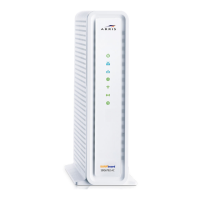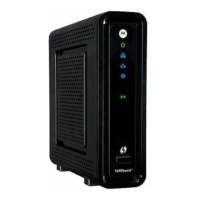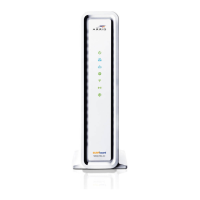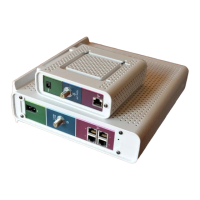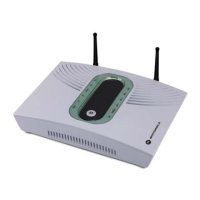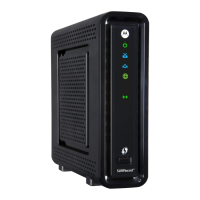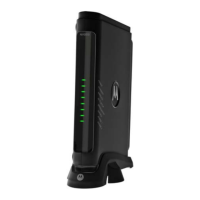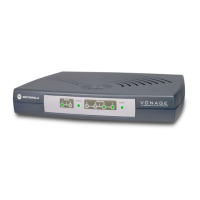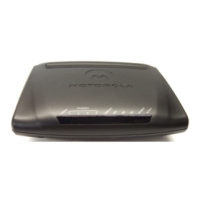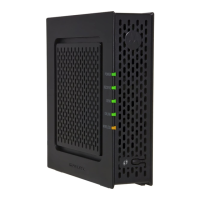
Do you have a question about the Motorola SURFboard SBG901 and is the answer not in the manual?
Basic safety precautions to reduce risks of fire, electric shock, and injury when using equipment.
Equipment tested and found to comply with limits for a Class B digital device per FCC Rules.
Device compliance with Industry Canada Rules and radiation exposure limits.
Overview of the SBG901's integrated features: cable modem, wireless access point, Ethernet, and firewall.
Guidance on simplifying local area network configuration with the SBG901.
Description of different connection options for computers to exchange data via SBG901.
Highlights the SBG901's combined capabilities for high-speed internet, networking, and security.
Description of the SBG901's front panel indicator lights and client pairing button.
Details on the SBG901's rear panel cabling connectors and power receptacle.
Information on the label located on the bottom of the SBG901, including MAC address.
Explanation of wireless communication and requirements for WLAN setup.
Instructions for connecting PCs to the SBG901 using Ethernet connections.
Details on the SBG901's advanced firewall capabilities for network protection.
Explanation of De-Militarized Zone (DMZ) configuration for specific applications.
How to configure port triggers for applications that require specific incoming communications.
Methods to enable wireless security and prevent unauthorized access to the WLAN.
Configuration of port forwarding to map TCP/UDP ports to a local PC for accessibility.
Checklist of included items and initial preparation before installing the SBG901.
Important safety precautions and handling instructions for the SBG901.
Steps and considerations for signing up with an Internet Service Provider.
Minimum system requirements for computers connecting to the SBG901.
Step-by-step guide for physically connecting the SBG901 to the cable system.
Instructions for connecting the wired Ethernet LAN to the SBG901.
Methods for obtaining an IP address for a computer's network interface.
Instructions for configuring TCP/IP settings on different operating systems.
Steps to check the IP configuration in Windows 2000/XP and Vista.
Procedure to renew the IP address for Windows 2000, XP, or Vista.
Guidelines and steps for mounting the SBG901 unit on a wall.
Instructions for printing and using the wall mounting template for the SBG901.
How to access and start the SBG901 Configuration Manager (CMGR) via a web browser.
Description of the SBG901 Configuration Manager menu options bar.
Explanation of how submenu options are displayed and selected within the CMGR.
Procedure to change the default administrator username and password for the SBG901.
Steps to reset the SBG901 username and password to original factory settings.
Information on how to access help for any menu option within the SBG901 interface.
Guidance on configuring the SBG901 firewall and DMZ specifically for gaming.
Advice on firewall settings for optimal gaming performance, including port requirements.
Information on pre-defined and custom port triggers for gaming applications.
Steps to designate a computer as a DMZ host for problem applications or gaming.
Instructions on how to log off and close the SBG901 Configuration Manager.
Displays hardware, software, MAC address, IP, and registration status information.
Shows HFC and IP network connectivity status for the SBG901 cable modem.
Allows definition of administrator privileges by changing username and password.
Provides diagnostic tools for troubleshooting IP connectivity problems.
Utility to check network connectivity between the SBG901 and other devices on the LAN.
Tool to map the network path from the SBG901 Configuration Manager to a public host.
Lists critical system events in chronological order, including time, priority, and description.
Configuration of basic SBG901 gateway features related to ISP connection.
Configuration and status viewing for the internal SBG901 DHCP server for the LAN.
Setup for Dynamic Domain Name System (DDNS) service for easier access.
Saving current SBG901 configuration or restoring previously saved configurations.
Procedure to restore SBG901 settings from a backup file.
Steps to create a backup copy of the current SBG901 configuration settings.
Setting operating modes for adjusting how the SBG901 routes IP traffic.
Defining IP address filters to block Internet traffic to specific network devices on the LAN.
Defining MAC address filters to prevent PCs from sending outgoing traffic via MAC addresses.
Procedure to enter MAC addresses to block specific PCs from WAN access.
Defining port filters to prevent devices from sending outgoing TCP/UDP traffic on specific ports.
Specifying mapping of TCP/UDP ports to a local PC for running publicly accessible servers.
Configuring dynamic triggers to specific devices for applications requiring specific port numbers.
Specifying the default recipient of WAN traffic that NAT cannot translate to a local PC.
Procedure to enter a computer's IP address to activate it as the DMZ host.
Configuring RIP parameters for authentication, destination IP, and reporting intervals.
Configuring firewall to enable/disable Web filters for blocking or allowing data types.
Setting up notification of firewall event logs via email alerts or local storage.
Sending firewall attack reports to a standard SysLog server for long-term logging.
Master page for setting time access rules, content filtering, and login passwords for users.
Setting rules to block certain types of Internet content and specific websites.
Blocking Internet traffic based on day and time settings for specific devices and users.
Displays a running list of the last 30 Parental Control access violations.
Guidelines for using the SBG901 as an access point for a wireless LAN.
Methods to encrypt wireless transmissions to prevent unauthorized viewing of data.
Configuring Access Point parameters like SSID and channel number.
Configuration of WEP keys and/or passphrase for wireless security.
Configuring Access Control to the AP and viewing status of connected wireless clients.
Configuration of data rates and Wi-Fi thresholds for wireless performance.
Configuration options for Wireless Distribution System (WDS) features.
Configuration of Wi-Fi Multimedia Quality of Service (QoS) parameters.
Configuration of a secondary, isolated guest network on the wireless interface.
Steps to configure a wireless client for WPA or WPA2 encryption.
Procedure to configure a wireless client with the same WEP key as the SBG901.
Instructions for entering the network name (SSID) for wireless client communication.
Provides solutions for common problems like power issues or connectivity failures.
Explanation of SBG901 front panel LED status and error conditions.
